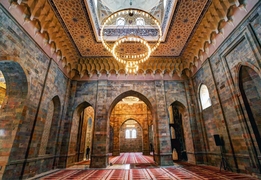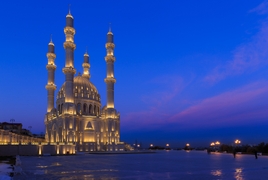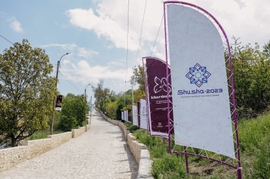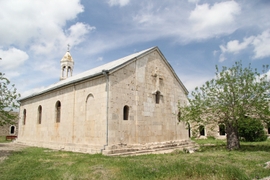A week-long promotion of Azerbaijani culture is taking place in various cities across Iran, helping to forge cultural ties, promote regional tourism and mend differences in competing historical claims between the two southwestern Asian neighbors.
Azerbaijan’s Minister of Culture and Tourism Abulfaz Garayev, who was visiting Tehran to help kick off “Days of Azerbaijani Culture,” said at a meeting with his Iranian counterpart Reza Salehi Amiri on July 3 that the effort will create a bridge between libraries, museums and cultural organizations.
“Iran and Azerbaijan have a long history of civilization and culture and share many social and lingual traditions with each other," said Amiri.
The six-day event includes photo exhibitions, concerts and other artistic performances, and runs from July 3-9.
Culture, history, demographics and Shia Islam unite Azerbaijanis and Iranians, but simultaneously divide them. Although Azerbaijanis are ethnically Turkic, linking them with Turkey and the peoples of the Central Asian Republics, over 16 percent of Iran’s population of nearly 83 million, most of whom identify as Persian, is considered Azeri, or ethnic Azerbaijanis.
In December 2013, UNESCO recognized the horse-riding game chovgan – an ancient precursor to polo, which is played in Azerbaijan, Iran, Tajikistan and Uzbekistan – as part of Azerbaijan’s intangible cultural heritage. Iranian media and officials accused Baku of deception and trying to “register the Iranian game 'chogan' with UNESCO as Azerbaijani heritage.”
The game is played with the Karabakh horse, reinforcing its historical link with the South Caucasus region, in which Azerbaijan lies. Despite UNESCO’s recognition of the game’s Azerbaijani origins, Iran’s former Vice President and head of the Cultural Heritage, Handicrafts, and Tourism Organization Masoud Soltanifar initiated a bid in 2016 to have chovgan recognized by UNESCO as an Iranian sport.
Disputes have also extended into the arts, particularly music. Iranian officials slammed the 2012 registration of the tar, a long-necked lute, as Azerbaijani cultural heritage. Mainly used in the composition of mugham, a unique musical genre blending throaty song with a trio of instruments, the tar is integral to the style of folk music found in both Azerbaijan and Iran.
The two countries also dispute the origins of the 13th century poet Nizami Ganjavi, who lived in the western Azerbaijani city of Ganja, but wrote almost all his poems in Persian. Because Ganjavi's home city was in modern-day Azerbaijan, a country first founded in the early 20th century, Baku supports the notion that his legacy belongs to Azerbaijan.
In October 2013, the Azerbaijani government replaced Persian inscriptions on the Nizami Mausoleum in Ganja with Azerbaijani ones, prompting Iranian Vice President Mohammad Ali Najafi to send a letter to UNESCO’s head Irina Bokova, in which he described Azarbaijan’s move as “incomprehensible and non-cultural.”
But Baku and Tehran are hoping to see beyond the differences and play up similarities, at least for one week. The Iranian Academy of Arts is hosting a photo exhibition entitled “Azerbaijan of Today” in Tehran, while several movies by Azerbaijani directors are scheduled to go on screen at the Arasbaran Cultural Center in the same city. Honar Hall, also in the capital, is hosting musical comedies by Azerbaijani classic composers, including the father of Azerbaijani composed classical music and opera, Uzeyir Hajibayov. Additionally, an Azerbaijani orchestra gave a performance at Tehran’s Vahdat Hall, and in the city of Isfahan.
Iran’s move to host a week of all-things-Azerbaijani is reciprocal to Baku’s “Iranian Culture Days,” which were held during the fourth Islamic Solidarity Games from May 12-22. The Culture Days program aims to develop bilateral cultural cooperation between the two countries, as well as promote culture, art, and tourism potential within the region.


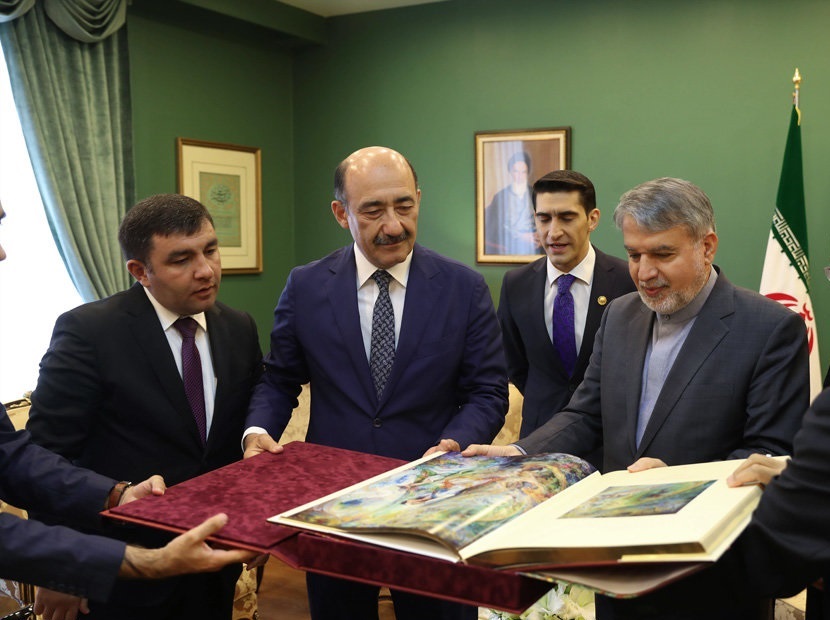




 Armenian sappers commenced on Monday mine-clearance operations in the territories adjacent to the Saint Mary Church in village of Voskepar (Armenia...
Armenian sappers commenced on Monday mine-clearance operations in the territories adjacent to the Saint Mary Church in village of Voskepar (Armenia...
 Russian Foreign Minister Sergei Lavrov has reasserted that Moscow has no intentions to stop the fighting in Ukraine, even if peace talks commence.
Russian Foreign Minister Sergei Lavrov has reasserted that Moscow has no intentions to stop the fighting in Ukraine, even if peace talks commence.
 Iran has refuted reports of alleged damage to Shimon Peres Negev Nuclear Research Centre located southeast of Dimona, Israel, during the recent air...
Iran has refuted reports of alleged damage to Shimon Peres Negev Nuclear Research Centre located southeast of Dimona, Israel, during the recent air...
 Iran and Pakistan have signed eight cooperation documents in various fields, and agreed to strengthen ties to fight terrorism in the region.
Iran and Pakistan have signed eight cooperation documents in various fields, and agreed to strengthen ties to fight terrorism in the region.
